At just 26 years old, Eline Ferket is already an inspiring professional in the specialty coffee world. Originally from the Netherlands and currently based in Vienna, Austria, she brings a rare combination of passion, purpose, and playful creativity to every cup she brews and every event she hosts. With nearly a decade of experience in coffee, Eline’s journey has taken her from curious teen barista to Austrian Brewers Cup Champion, Barista League Europe winner, and co-founder of the empowering She Brews Collective.
Whether preparing for a championship, shaking up a signature cocktail at her LATES events, or working behind the scenes at Wildkaffee and 25GRAMS, Eline is reshaping the industry with intention and inclusivity. Her work advocates for systemic change, especially around gender equity and producer empowerment. Eline proves that success in the coffee industry is not just about precision and passion; it’s also about purpose.
Eline’s story is an inspiring reminder that the most powerful movements sometimes start with a simple cup shared – and a mission that dares to dream bigger.
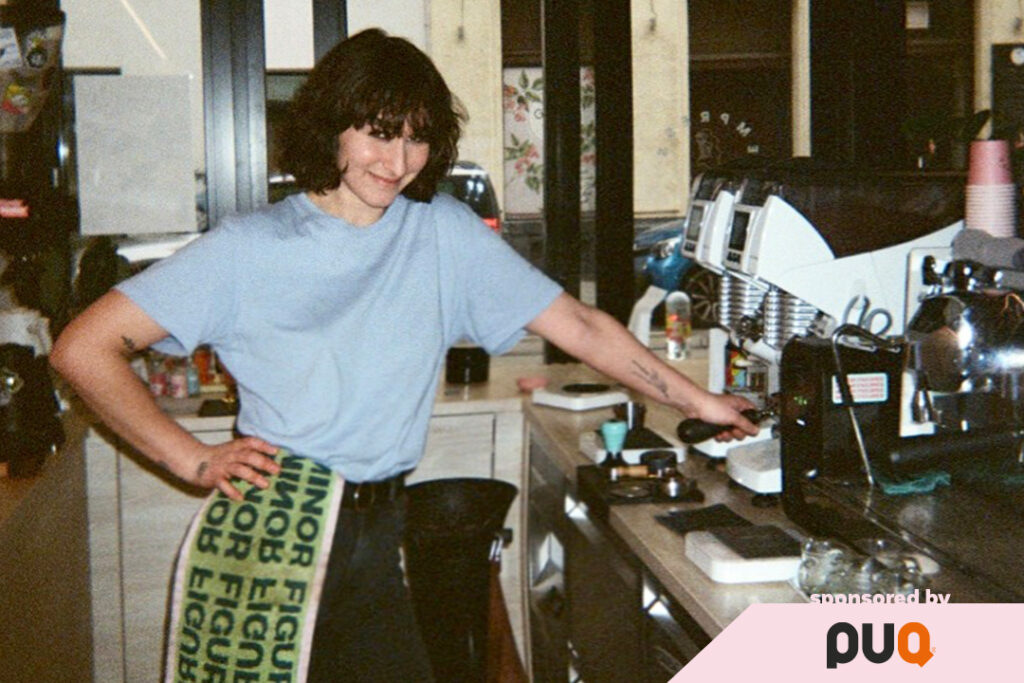
Eline, what is your first memory with coffee?
My earliest memory is of my parents drinking filter coffee every morning and whenever guests were over. As a kid, I was strictly forbidden from having any because it was “for adults only”. I can guarantee this is not true. I am still not an adult, and I drink a lot of coffee. When I finally snuck a sip, I hated it, but I felt very cool. Nowadays, I love it, but feel very uncool 😉
What inspired you to pursue a career in the coffee industry, and how did you get started?
I never worked in any other field, as I stumbled into the coffee industry as a kid without realizing it was a real industry. I was just looking to make friends and earn some extra money, and coffee always seemed like a very fun, friendly option. For a long time, I saw coffee as a side gig, and was told from different sides that I’d need a “real job” after university.
During my Master’s in Glasgow, I remember feeling quite sad to think that it would be my last year working in coffee. I think that’s when something clicked, and I realized coffee is my real job, and I was lucky to have found something I’m passionate about. Once I fully committed to that, the world of coffee truly opened up for me, and I discovered all of the exciting possibilities and sides of the industry.
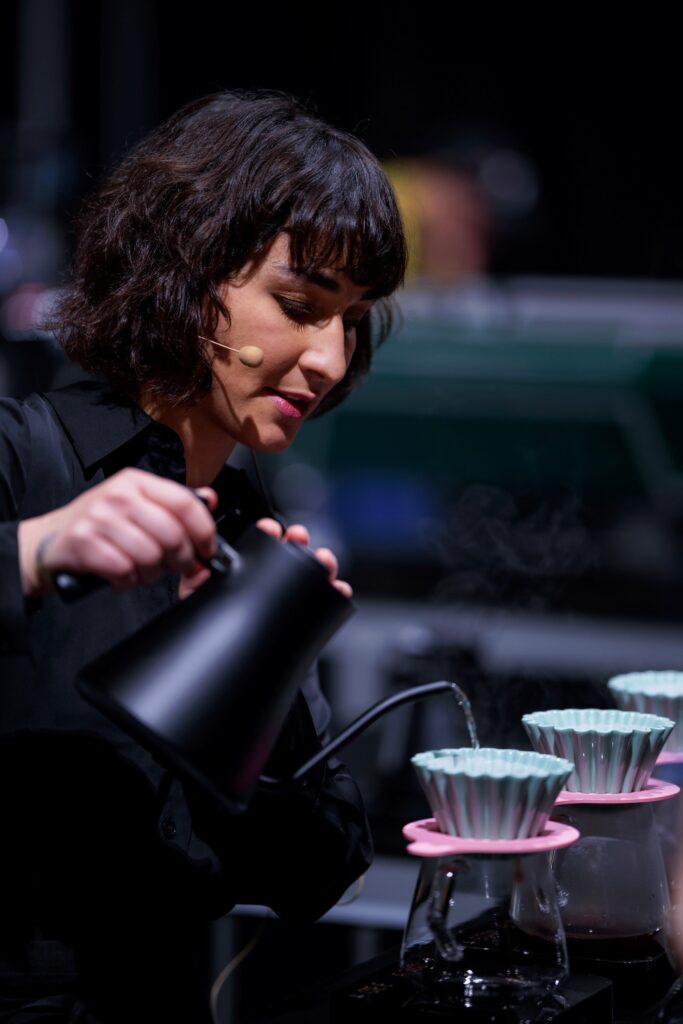
Tell us a bit about the place you work at. What is your role there?
I work at Wildkaffee, a roastery based in Germany, but I work out of our showroom in Austria. We are a small team, and the roastery is growing a lot globally, so there is a lot to do all the time, and we all have to share the workload. My focus is on maintaining the showroom operations, coordinating the 25GRAMS cold brew production and sales (25GRAMS is our cold brew company), sometimes helping out with creating some content, doing festivals and events, a bunch of stuff, and… there is more coming!
You’re also involved in / leading multiple projects. Can you tell us about them?
First and foremost, I am a co-founder of She Brews Collective – a collective that we (a group of fellow women in my coffee community) founded on Women’s Day 2024 with a mission to connect and empower women in coffee. We host public cuppings, where we work together with Semilla Coffee to cup coffees produced by female coffee producers, share their stories, and try to bring awareness to some of the hardships they face and the incredible coffees they produce. We also host workshops, talks, and round tables, basically anything to uplift and empower women in our community, and hopefully one day also beyond.
If She Brews Collective can at least make one woman believe in herself and give her access and connections to the resources she needs to succeed, I feel like that’s proof of concept, and I am happy to see that our mission has resonated so well with everyone in our industry – it proves that there is a real need for this.
Next, I also host a much less serious coffee cocktail pop-up event called LATES. It started out quite impromptu at a cafe I used to work at, where I realised I like getting creative with signature coffee cocktails. Now I am truly lucky that the local specialty coffee and tea scene trusts me with their beautiful shops to throw a party at once every few months with completely new drinks, and I feel like there is always a fun energy and buzz around a LATES. This event isn’t about anything deep or serious; it’s truly just about having a great night, enjoying some unique cocktails that you can have only once and never again.
As someone who wears many hats — barista, competitor, mixologist, co-founder of She Brews Collective — how do you balance these roles, and what drives you to stay involved in so many areas?
How to balance all of these different things I’m involved with is a hard question that I am definitely still trying to figure out myself, and I realise sometimes it actually gets to be a bit too much. It used to be quite a bit easier before I got more serious about competition.
Lately, I feel like my main focus is very much on Brewers Cup, and the other things tend to fall to the sidelines a little, especially getting closer to the World Brewers Cup in May. This is my first time doing a World Championship, and I am noticing that this is taking up pretty much all of my time now, leaving very little for other projects. I am okay with that for now because it’s also a lot of fun, and I notice myself getting better and learning, and there is a clear end date in sight after which I can go back to things I am putting off now.
With She Brews Collective, it is great that we are a team of 6 founding members, so we can definitely split up a lot of work and take responsibility for different tasks, which means we can be very active as a collective.
I mostly split up my time between my working hours to focus on what I have to do there, which thankfully also partly includes Brewers Cup training, and then after work, I just go through phases of focusing on whichever side project is most relevant at that time. What drives me to stay involved in all of this? I think I need a few more therapy sessions to get an answer to that, too, but in very simple terms, I think I’m too passionate about all of this to just sit back and do nothing.
The coffee industry is great, and I love it, but there are a lot of problems that we need to tackle, and I can’t just watch and not do anything to try to contribute to solutions. Sometimes we all believe that we can’t change how things are done, but we really can if we go for it and find people who are on the same mission, like with She Brews Collective. I feel a bit of responsibility to contribute to making this industry one that can last.
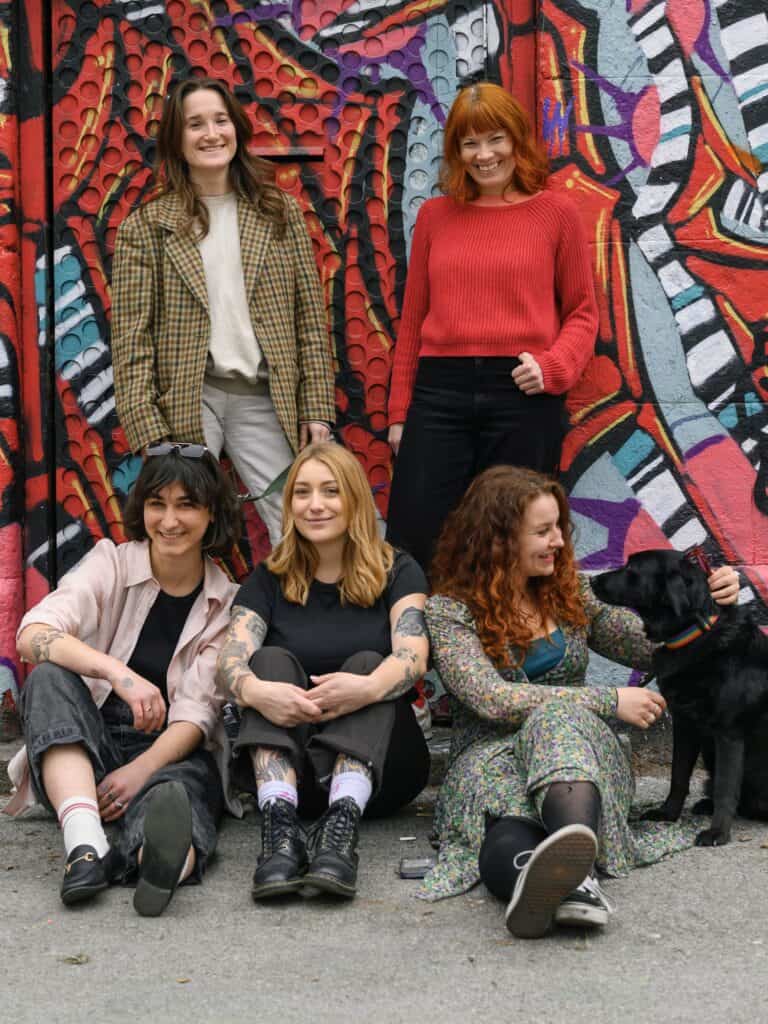
Can you share a pivotal moment in your career that shaped your perspective on diversity and inclusion in the coffee industry?
I don’t think there was one pivotal moment, but an accumulation of a bunch of different moments that proved to me that we do have a very diverse industry, but often inclusivity is lacking, and there is a lot of marginalisation. From my own perspective, there were many instances where the fact that I am a young woman caused people that I had to work with to dismiss me, talk over me, not even see me in the room, and I noticed that I had to be very loud and work very hard to be given the level of credibility that was just a given to my male counterparts.
I often think about how, as a white person living in the global North, I am navigating the world with a high level of privilege, and still, I have these experiences. This is quite a thought for me, because it means that these experiences are multiplied, and then some, for others that are less privileged than I, based on their gender identification, sexual orientation, or race. I’d like to see that as a step in the right direction, we all give each other a bit more time and space to talk, and to be mindful of when it’s time to take a step back and say nothing, so that someone else has the opportunity. I think that already would be a big improvement, and it’s not even that hard; you just need to be aware.
What are the biggest challenges you’ve observed in promoting equality and inclusion within the Austrian specialty coffee scene?
With She Brews Collective, a challenge we’ve faced is being perceived as exclusive, when we are trying to make our industry more inclusive. I think this comes from having some events that we market as: for women, by women. This doesn’t mean that it is strictly ‘women only’, but we know that there is a necessity to connect and empower women, something that is close to our own hearts and that affects us directly, and that’s why our events and messages we put out into the world are focused on this.
Without a clear focus, our mission would be diluted. I think the conclusion many people jump to is that our focus on empowering women must mean we are on a mission to push anyone else down and out of the way – this is obviously not what we want to do. I believe that empowering women is not a threat to anyone else; it is an effort to make our industry more inclusive and equal, because right now it’s not.
Our first year consisted of trying to tackle that challenge, and I think we now have a good foundation, and most people know what the deal is. The next challenge is to get more value out of the events that we host for the community, and have something more concrete that holds the collective together, that’s bigger than just us co-founders and incorporates everyone in the She Brews Collective community. I think once we have that, we will have some strong footing to stand on and grow from, hopefully internationally too. We are working on this!
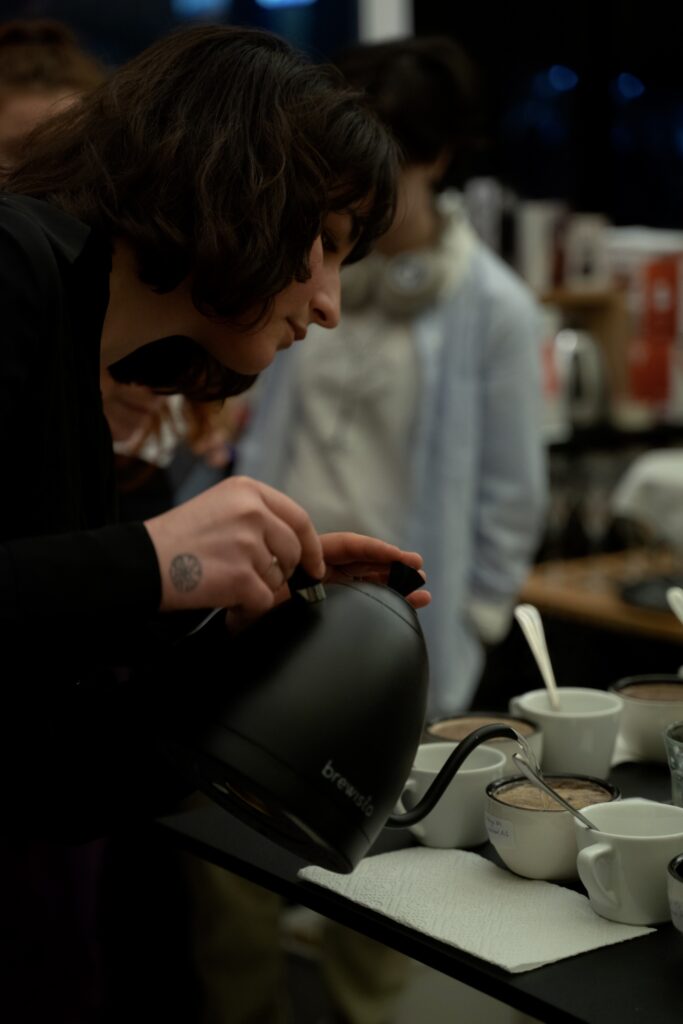
If you could change one thing about the coffee industry today, what would it be and why?
I get asked this question a lot – I wish it were as easy to do as it is just saying it! Of course, with She Brews Collective, a topic that’s close to my heart is the empowerment of more women in coffee, and making that a more level playing field, but actually primarily, I would love to see power being shifted more into the hands of producers. This is an area that I need to learn about more; it’s very complicated, dependent on the producer and region, but the common thread is that the industry seems to be designed around the success of those towards the end of the supply chain, not those at the origin of it.
Without producers, the rest of our industry wouldn’t exist – they are inherently a vulnerable link in our value chain and therefore I’d love to see a model of the industry where the risk isn’t mostly on producers, resources are distributed more fairly and where they are providing the most value (which, in my opinion, would be at origin), and pricing reflects the level of quality and work put into the product. This is, of course, easy to say, but it would be a massive change that needs to be collaboratively tackled one piece at a time.
I just hope that awareness of this issue, which is a sustainability, social and economic issue, will result in better individual business practices and slowly but surely have a bigger impact.
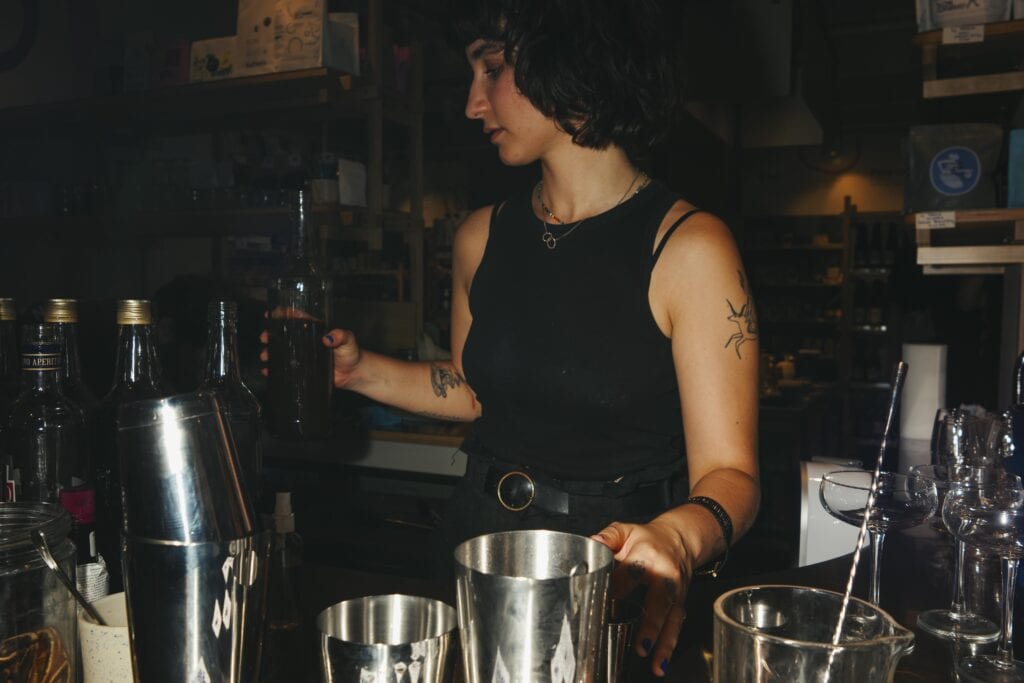
How do you stay motivated and inspired to keep improving your coffee-making skills?
During Brewers Cup training, I love to see how something that was really hard when I first tried it became super easy after some practice. I have a natural love for coffee, but not a natural talent – being able to things like make quick and strategic dial in decisions during a compulsory round, brewing consistently on stage whilst talking, being able to identify flavour descriptors and identify defects takes many hours of practice, for many days in a row.
It’s really satisfying to see that as time goes on, I end up being able to do things that I really couldn’t do before, and the list of things I am learning just keeps getting bigger. The brewer I am now is much better than the brewer I was when I won the Austrian Brewers Cup in November 2024. It is quite exciting because I thought I was at my peak back then (cute idea, definitely not true).
Coffee is also something that changes so fast, with new varieties, tools, products, and research findings coming out every day. I love how Brewer’s Cup forces you to keep up with that and pushes you to focus on every tiny little element of consistently pushing your skills to improve the quality of your brews, and I love actually being able to see the difference that makes.
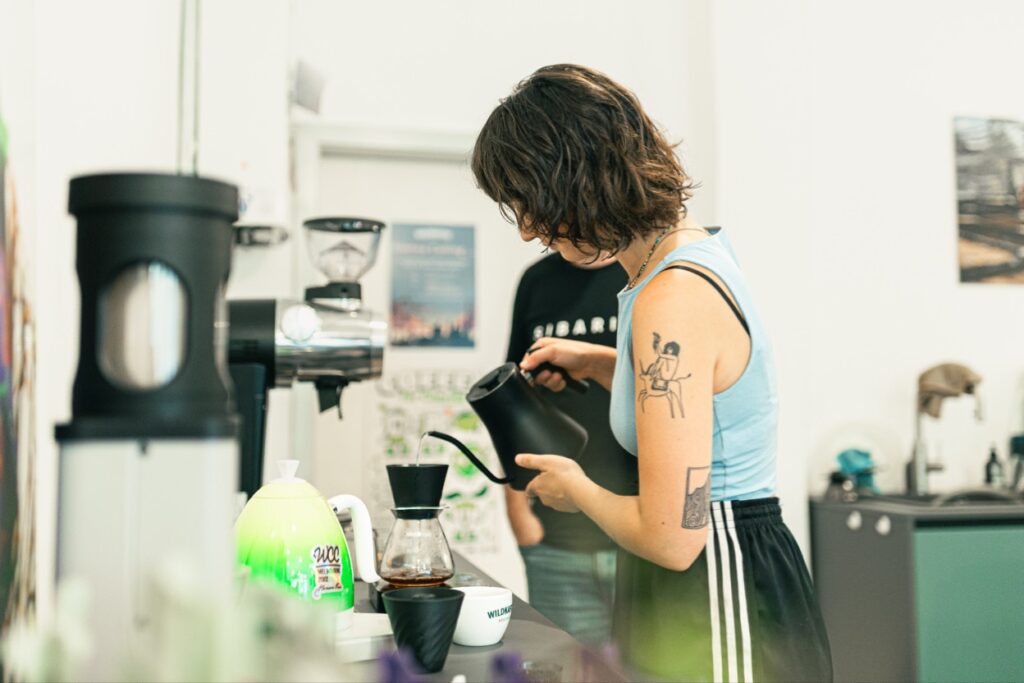
What are the current trends in cafes in your region? Are there any trends you promote yourself and would like to see more often in other places?
I think an upcoming trend is Omakase-style coffee service, where guests can get a full coffee presentation and curated experience, showcasing different coffees, brewing methods, and drinks. I like this a lot, as it shows that there is more general public interest in the complicated and intriguing world of coffee, and it’s not just seen as a quick and cheap caffeine boost. It also gives us coffee professionals a fun challenge and a way to bring more creativity into coffee service.
In Asia, this is already happening way more, but in Austria, I can imagine it will take some time to catch on. It’s expensive here to start something like this, and the traditional Austrian coffee houses are part of the culture here and will not be let go of, which is fine, but sometimes this makes it a challenge for niche specialty coffee trends to be picked up here. Regardless, I see specialty coffee shops adding more creative experience-based elements to their coffee service, proving that coffee is much more than a drink!
You have some amazing achievements in championships. Can you tell us more about them?
I feel quite new in the world of coffee championships, I only started competing in 2023 in the Austrian Brewers Cup. That year, I placed Third, and I loved the experience; it opened a lot of doors and gave my coffee knowledge and connections a big boost, so I wanted to try again and apply everything I learned. I understood some big areas where I lost points the first time around, and I spent an entire year building a coffee and a routine that I thought would win.
Every decision I made that year was around the question: “Will it help me win Brewers Cup?”. Then I did end up winning in 2024, with a beautiful carbonic maceration washed geisha from Mikava. Now I am training for the World Championship, which will take place in May, in Jakarta. I enjoy the journey of competing, I don’t expect to win the first time, but I see it as a first trial to do the best I can with what I know at this point in time, and then try again, apply everything I learned from that first time, make improvements, and hopefully score better. I thankfully also learned that winning first place is a small prize next to all of the connections, experiences, friends, memories, and learnings that you gain through the experience and process of competing.
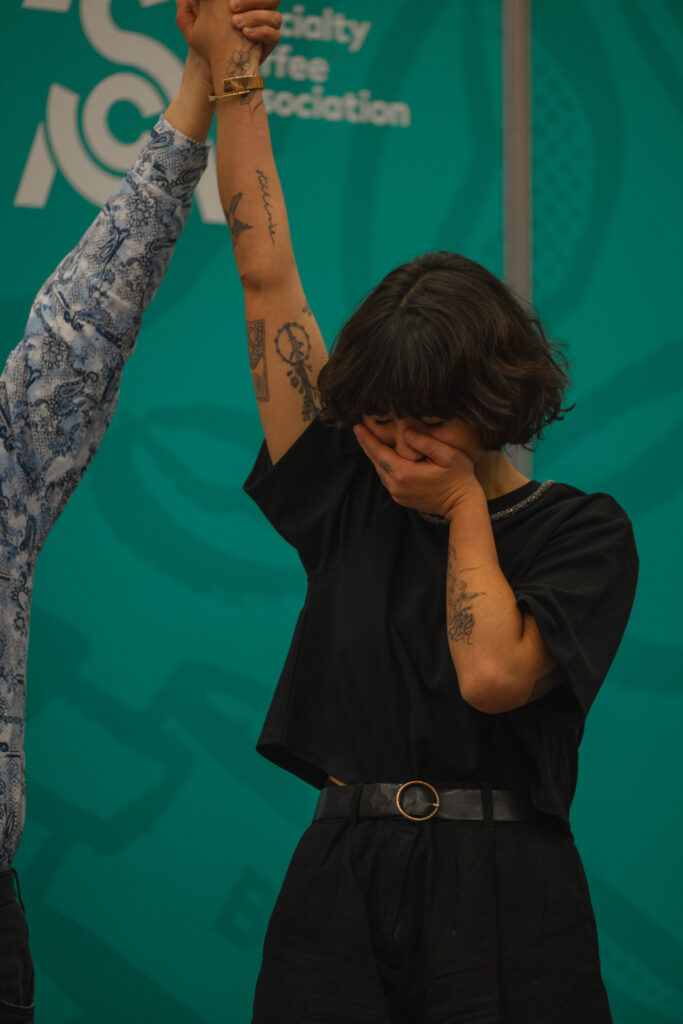
How are your preparations for WBrC in Jakarta going?
They are going okay, I think! It’s my first World Championship, so it feels quite a bit different to preparing for Nationals, and I am in unknown territory, but I am really lucky to have the help and support of a great team and a great community here in Austria.
I think I understand what a winning routine would look like for me, what is being looked for by the judges, and how to get there, so I am keeping this in mind with everything I do. It is a bit of a puzzle, except you also have to find all of the pieces before you put them all together, but right now, in the last month, I do feel like I am starting to get the full picture and am going in a good direction.
I might only get one chance at doing a World Championship, so I want to make sure that I am making progress every day, that I really step it up now and work as hard as I can, so that I know that I did everything I could have done – however that will place in the ranking! It’s also so amazing getting to taste and work with what I think are some of the best coffees in the world right now, it’s just crazy, sometimes I have to pinch myself.
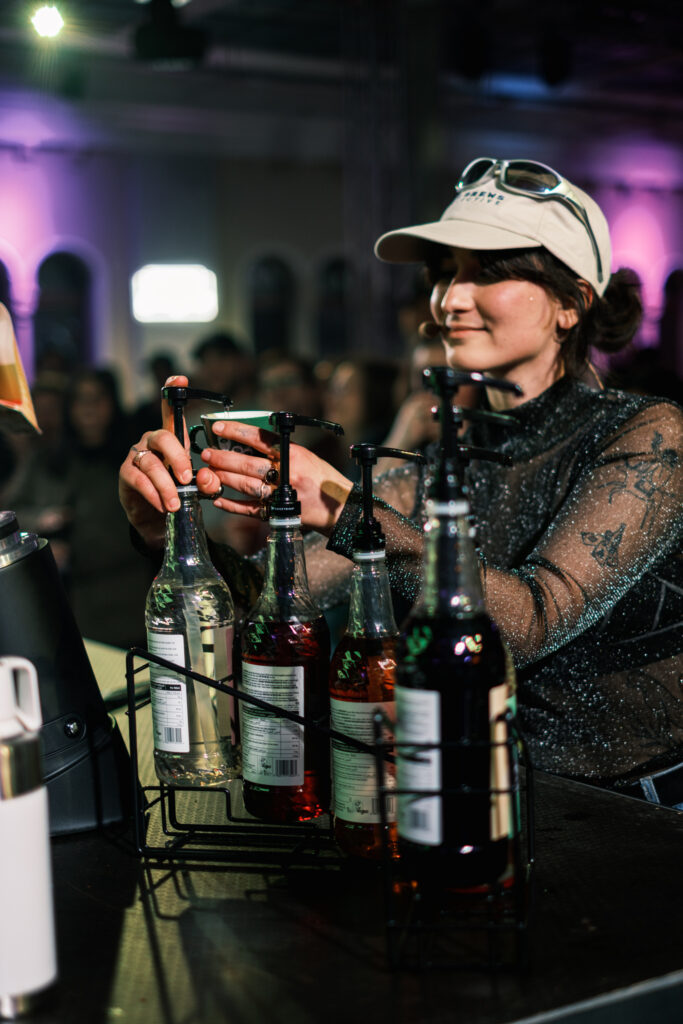
Meanwhile, you’ve also taken part in The Barista League and won it as a Team with Luisa! How did it feel? How different was it from SCA championships?
That was so much fun! Luisa and I have been wanting to compete together in the Barista League for a year now, so we were really looking forward to it. We went in without any expectations, only to make new friends, have fun, and represent She Brews Collective, so we were very surprised to win.
I think this competition is different from SCA championships because there is very little you can actually do to train for it, and you have to rely on your years of experience in coffee to come together on stage. Just because we both compete in Brewers Cup and have done well, it really does not guarantee or translate over to any outcome in The Barista League, as it’s a completely different type of competition and environment. Luisa and I had discussed our general workflow and how we would split it up on stage based on our individual strengths, and also roughly what we would tell the judges, but we let the rest happen naturally.
In SCA championships, you can’t really leave anything up to chance, you have to coordinate and think of everything you do on stage and be quite strategic about everything. It’s nice to have the chance to let go of that rigidness a bit and do a bit of an impromptu routine on stage. I think having done SCA championships does help here because they teach you how to make quick decisions, how to perform on stage under time pressure, and of course, they boost your coffee knowledge and skills to help you create and balance out drinks in the best way.
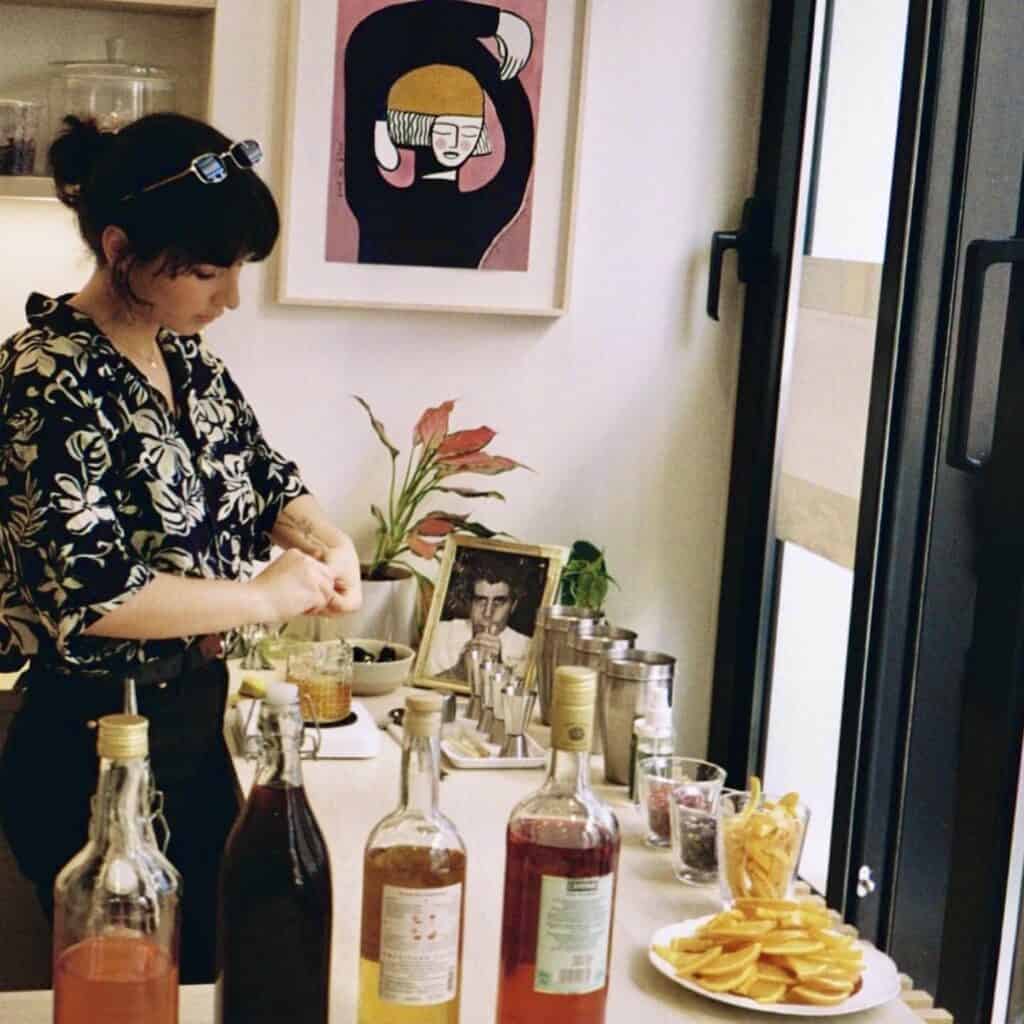
What hobbies do you have besides your considerable projects?
Not sure if it’s classified as a hobby, but I primarily love eating. My best friend and I host annual potato parties, where everyone needs to bring a potato-based dish. We invite everyone we come across on that day, and the party usually goes on until the next morning. I also love baking, especially pistachio cheesecake, cardamom knots, and someday I’d love to take part in the World Tiramisu Championships.
Since I started competing in coffee, I’ve also gotten into running, pilates, and football. I started as a way to build perseverance for competition—training myself to push through even when I didn’t want to. Now, I genuinely love it, and it helps clear my head.
I play piano and guitar, but only for myself when I’m alone, since I don’t like playing for people. I was a cello soloist for several years, and I kind of miss it and would love to get back into that at some point. Someday I’d also love to try ceramics and pottery. One time I made a ceramic spoon and it was so satisfying, I would love to do more of that.
What challenges are you looking forward to? Any other projects or collaborations?
I am really excited about an upcoming collaboration that She Brews Collective has planned with Wendelien van Bunnik’s Happy Coffee Network for WOC Geneva! Can’t share too many details yet, but this collaboration is a match made in heaven. I think we can learn from each other a lot and create stronger foundations in the international coffee community together, which is super exciting. Stay tuned for more on that!

Quick Fire Questions for Eline Ferket:
Filter coffee or espresso-based?
Filter coffee.
Milk coffee or black coffee?
Black.
The most underrated coffee drink?
Clarified coffee sour.
The most underrated coffee brewer?
The Melitta Aroma boy <3
What brewing method do you use at home?
Orea V4 with the Fast attachment, or a Hario Switch.
Favourite barista tool?
Double-sided brush!
The number one place in Europe that every coffee geek should visit?
Ukiyo Koffie in Utrecht, the Netherlands
Favourite city outside your own for a coffee tour and why?
I love Glasgow, there are so many cafes there, really great coffees, really great people. But I’d also love to explore more cafes in producing countries!

